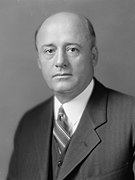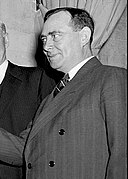| |||||||||||||||||||||||||||||||||||||
All 436 seats in the United States House of Representatives 219 seats needed for a majority | |||||||||||||||||||||||||||||||||||||
|---|---|---|---|---|---|---|---|---|---|---|---|---|---|---|---|---|---|---|---|---|---|---|---|---|---|---|---|---|---|---|---|---|---|---|---|---|---|
| |||||||||||||||||||||||||||||||||||||
 Results: Democratic hold Democratic gain Republican hold Republican gain | |||||||||||||||||||||||||||||||||||||
| |||||||||||||||||||||||||||||||||||||
The 1958 United States House of Representatives elections was an election for the United States House of Representatives to elect members to serve in the 86th United States Congress. They were held for the most part on November 4, 1958, in the middle of Dwight Eisenhower's second presidential term, while Maine held theirs on September 8. There were 436 seats during these elections: 435 from the reapportionment in accordance with the 1950 census, and one seat for Alaska, the new state that would officially join the union on January 3, 1959.
The economy was suffering the Recession of 1958, which Democrats blamed on Eisenhower. The President's Republican Party lost 48 seats in this midterm election, increasing the Democratic Party's majority to a commanding level that Republicans would not be able to overcome for another 36 years.[1] Another factor which may have contributed to the Democratic gains include public consternation over the launch of Sputnik and Cold War politics.
Disappointment with the results led House Republicans to replace Minority Leader Joseph W. Martin Jr. with his deputy, Charles Halleck.
Cite error: There are <ref group=lower-alpha> tags or {{efn}} templates on this page, but the references will not show without a {{reflist|group=lower-alpha}} template or {{notelist}} template (see the help page).
- ^ James Reston (November 6, 1958). "Democratic Gain 13 Senate Seats". The New York Times. Retrieved April 8, 2014.


